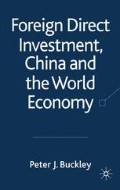Abstract
The key to international business is that it approaches empirical phenomena at a variety of levels of analysis, using a variety of theoretical frameworks. The most important levels of analysis are the individual manager, the firm, the industry, and the environment. In each category there is vast heterogeneity. Figure 2.1 illustrates this interaction between issues and theories. It has levels of analysis on the vertical axis and the basic social sciences on the horizontal axis as systems of thinking about the phenomena. It would also be possible to replace fundamental disciplines by the primary management disciplines (marketing, finance, strategy, etc.).
Access this chapter
Tax calculation will be finalised at checkout
Purchases are for personal use only
Preview
Unable to display preview. Download preview PDF.
References
Bartlett, C.A. and Ghoshal, S. (1989) Managing Across Borders: The Transnational Solution, Harvard Business School Press: Boston, MA.
Behrman, J. (2004) Comment presented at the AIB conference, Stockholm 2004 (Pioneer’s session).
Buckley, P.J. (2002) ‘Is the international business research agenda running out of steam?’ Journal of International Business Studies 33(2): 365–373.
Buckley, P.J. and Casson, M. (1976) The Future of the Multinational Enterprise, Macmillan: London.
Hofstede, G. (1980) Culture’s Consequences: International Differences in Work Related Values, Sage Publications: Beverly Hills, CA.
Hofstede, G. (1991) Cultures and Organisations, McGraw-Hill: London.
Mitchell, W. (2004) ‘Research methods in international business’, Second annual emerging research frontiers in international business studies conference, Michigan State University, 16–19 September 2004.
Porter, M.E. (1980) Competitive Strategy: Techniques for Analysing Industries and Competitors, Free Press: New York.
Prahalad, C.K. and Doz, Y. (1987) The Multinational Mission: Balancing Global Demands and Global Vision, Free Press: New York.
Vernon, R. (1966) ‘International trade and international investment in the product cycle’, Quarterly Journal of Economics 80: 190–207.
Vernon, R. (1979) ‘The product life cycle hypothesis in a new international environment’, Oxford Journal of Economics and Statistics 41: 255–267.
Author information
Authors and Affiliations
Copyright information
© 2010 Peter J. Buckley and Donald R. Lessard
About this chapter
Cite this chapter
Buckley, P.J., Lessard, D.R. (2010). Regaining the Edge for International Business Research. In: Foreign Direct Investment, China and the World Economy. Palgrave Macmillan, London. https://doi.org/10.1057/9780230248328_2
Download citation
DOI: https://doi.org/10.1057/9780230248328_2
Publisher Name: Palgrave Macmillan, London
Print ISBN: 978-1-349-35422-1
Online ISBN: 978-0-230-24832-8
eBook Packages: Palgrave Business & Management CollectionBusiness and Management (R0)

